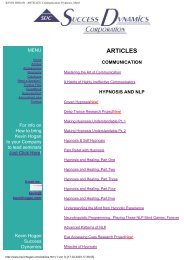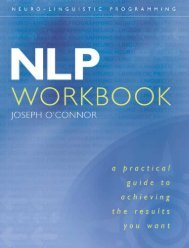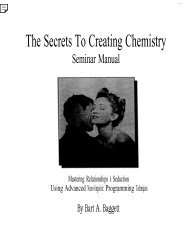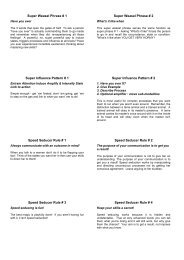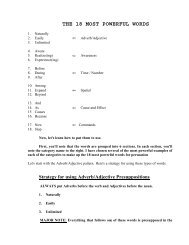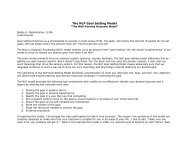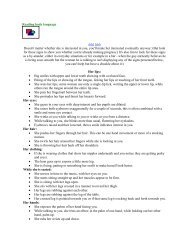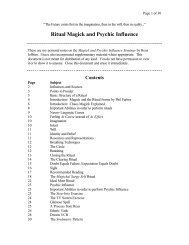A Pragmatic Guide To Communication & Change.pdf - NLP Info Centre
A Pragmatic Guide To Communication & Change.pdf - NLP Info Centre
A Pragmatic Guide To Communication & Change.pdf - NLP Info Centre
- No tags were found...
You also want an ePaper? Increase the reach of your titles
YUMPU automatically turns print PDFs into web optimized ePapers that Google loves.
78<br />
referential index with an appropriate Meta Model response are:<br />
Speaker: "I need help."<br />
Response: "What do you need help with."<br />
Speaker: "I'm being pushed into this mess." Response: "Who is<br />
pushing you?"<br />
Speaker:<br />
him?"<br />
"He's not respected." Response: "Who doesn't respect<br />
In situations where a person is uncomfortable with the possiblility of being<br />
confronted but still wants to express displeasure, this violation is often used. It<br />
allows the person to say something which may be controversial or cause conflict,<br />
like, "I'm being pushed into this mess," (deleting "by my boss"). Thus, the<br />
individual who might respond in an unpleasant way (his boss) has been deleted. This<br />
"safe" linguistic pattern is typically used by individuals operating from the auditory<br />
and digital representation systems.<br />
2. Unspecified referential index occurs when the noun or noun phrase does not name<br />
a specific person or thing. Words like "this," "that," "it," or even "thing-a-mabob"<br />
are all examples of unspecified referential index.<br />
Whenever a person leaves out or does not specify important elements of a sentence,<br />
he runs the risk of being misunderstood. The following illustration demonstrates the<br />
?s<br />
kind of problems which can arise. In this example, the woman expresses an<br />
emotional response to something that does not necesarily relate to the man. She<br />
may, for example, be "mad" about a run in her stockings. His response to her<br />
original statement, however, indicates that he has chosen to take it personally,<br />
setting the stage for what follows. Had the woman been more specific to begin<br />
with, the whole scene would have changed dramatically.<br />
Other examples of this Meta Model violation are:<br />
Speaker: "That just won't work." Response: "What specifically<br />
won't work?"<br />
Speaker: "This is important." Response: "What is important?"<br />
Speaker: "I don't want to talk about it." Response: "What don't you<br />
want to talk about?"<br />
As with the previous Meta Model distinction, Your goal in asking for the missing<br />
information is twofold: First, you are asking for information which will help you to<br />
better understand the speaker. This can aid in more effective communication.<br />
Second, asking for the information which is missing from the speaker's SS is one<br />
way of determining whether or not that information is even in the speaker's<br />
awareness. For example, if the speaker responded to the first question above with,<br />
"I don't know, specifically. It's just a vague sense that things aren't clicking," you<br />
immediately know several important things. You know, for example, that the<br />
individual is operating from the auditory representational system (see "Predicate<br />
Preference" in Chapter II). You also know that the original stimulus for the "vague<br />
sense" is outside of his conscious awareness, and, therefore, beyond his control.



